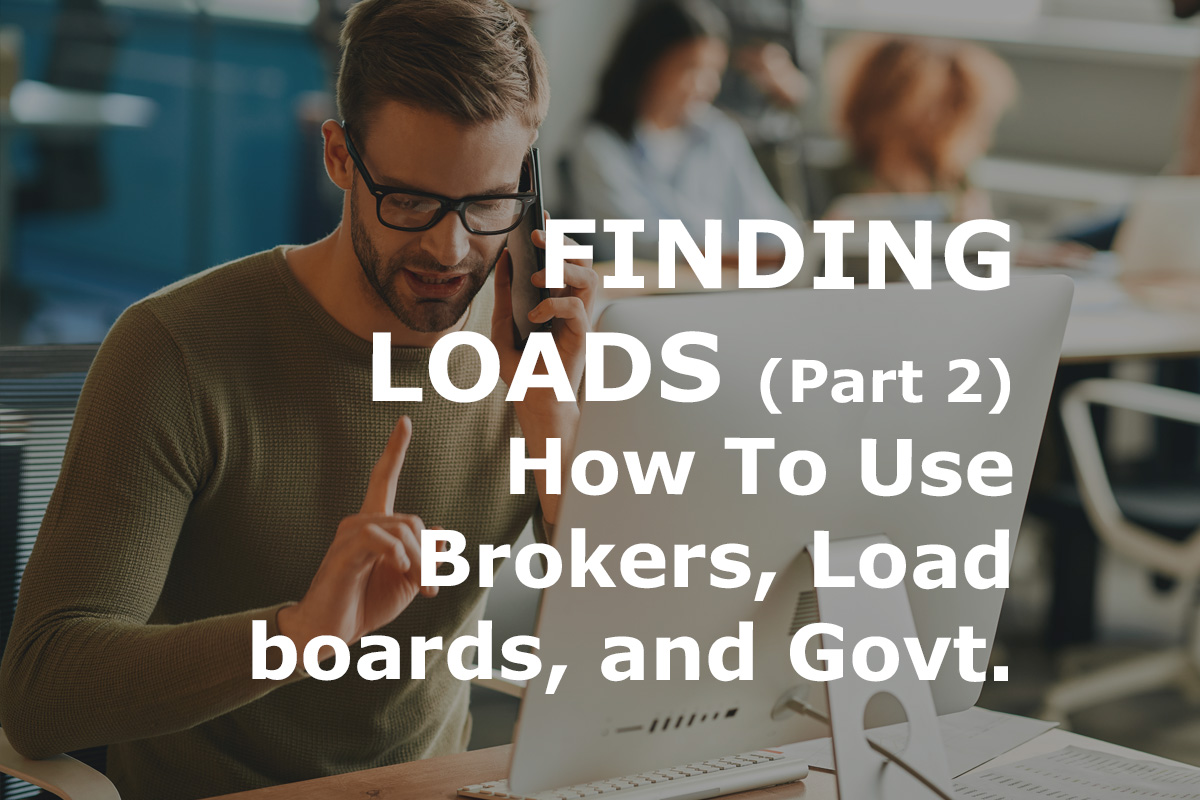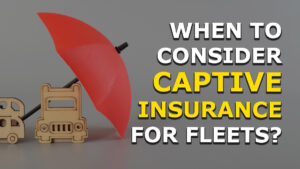There are a lot of ways to find loads, including brokers, load boards and government contracts, and each method has its benefits and drawbacks.
Carriers using freight brokers is the most common way to find loads. For a fee, they take on the effort to match loads with drivers.
Load boards are great to grab quick loads to get back to home or use to move to more profitable lanes.
Government contracts are a nice source of direct loads as you continue to build your customer relationships for your own direct shipper loads (which we will cover in the next article).
In this article, we will cover how to use brokers, load boards, and become approved to haul government contracts.
Tips for vetting brokers
Good freight brokers can bring peace of mind by connecting you with trusted shippers, negotiate the best rates to haul cargo, optimize routes to prevent deadhead miles, and help you save time to keep your wheels moving.
But with so many brokers, carriers should look for brokers with experience and make sure they are licensed, bonded, and insured.
Look for brokers with experience and be sure to read both the positive and negative reviews and start growing a relationship with them. The more you both trust each other, the better the loads being offered.
When you receive a load, note that the broker is negotiating rates on the back end with the shipper. We discussed this in a previous article.
Make sure the load makes sense for you and will make you money after the fees and general expenses.
You also need to be wary of double brokering.
[Related: New Trucking Companies Can Pay-Per-Mile For Insurance]
Double Brokering occurs when a carrier accepts a load and then rebrokers it to another motor carrier. This is not a legal practice.
Likely, the motor carrier that rebrokers the load is not authorized or in compliance with FMCSA and has become a big issue in the marketplace.
The rule of thumb here is if the rate seems too good to be true, then it IS too good to be true.
For example, if you know the market and see a load 75% over the fair market rate, the load is likely double, or even triple brokered and you may be ghosted after delivering the load and never get paid.
If you see these too good to be true rates, trust your gut and ask for more details. If they can’t answer them clearly, don’t keep wasting your time. These loads can hurt a month of profitability and, in this current market, could ruin your business.
How to you negotiate with brokers
Let’s start with the basics. It’s all about your sales attitude.
Like with any relationship, no one wants to be called or look “cheap”, so don’t call the broker rates too “cheap”. Complaining will make the negotiation go cold quick.
Similarly, do not demand “their best rate”, every haggler knows this.
Carriers need to know their lanes, average rates, and operational costs so you can make a decent negotiation. Show the broker that you know your numbers and be honest with not accepting a load if it doesn’t make you money.
For example, if you know that lane capacity is high, meaning there are a lot of carriers but not a lot of freight, then you may want to change lanes or accept a cheap load to get you out and accept a second more profitable load on the new lane.
The more quickly you can meet in the middle, the more you will consistently get good loads from the broker.
Next, you need to provide full details to the broker, they are not mind readers. Tell them your actual location and what equipment you are running so the broker can better estimate what loads are near you, anticipate loading times, cutoff times, and more.
Lastly, tell the broker which lanes or regions you run consistently as this helps you build consistency and reliability. The more details you provide upfront, the quicker they can work with you.
Need some sales training? My favorite book on this subject is “How to Win Friends and Influence People” by Dale Carnegie.
The book teaches you to:
- Become genuinely interested in other people.
- Smile.
- Remember that a person’s name is to that person the sweetest and most important sound in any language.
- Be a good listener.
- Talk in terms of the other person’s interests.
- Make the other person feel important – and do it sincerely.
Not only will the book help you with your business, but any personal relationships as well.
How to use a load board
Can’t get a good load from a broker and don’t want to deadhead for a long time?
The easiest way to find loads without a broker doing the research for you is using load boards. But be careful because they are very competitive.
Load boards are websites that allow shippers and brokers to make arrangements with carriers to move freight.
Many of these websites or apps allow you to search for loads in many ways, such as:
- by weight
- by route
- by commodity
- by equipment
- by specialty loads
- and more
They also let you check credit scores of brokers, see reviews of shippers and other carriers, and provide a source for additional services.
Some of the most popular load boards are:
- TruckerPath
- Truckstop.com
- DAT Loadboard
- 123Loadboard
- Direct Freight
- and many more
You will have to experiment with each one to determine which load boards to use, how many to use, build relationships and improve your profiles overtime to increase your competitiveness when finding loads.
There are also websites that feel like load boards but are slightly different, offering specific types of freight or a different type of third-party tools.
Unfortunately, too many carriers rely heavily on load boards. Using them excessively can squeeze your profit margins to the point where pulling the load is not profitable.
Much like spot-market freight, load boards have a place in the market, but if you rely too heavily on them, you will need to shift focus to other types of freight and get contract loads directly from shippers.
How to become a government contractor
The last option to consider are the local, state, and federal governments freight. This can open more load opportunities for you as you build other customer relationships.
Unlike the other types of loads, you will have to first register as a government contractor to be able to haul their load or partner with another company who is already under a government contract.
You can register by visiting the U.S. General Services Administration (GSA) website.
It is important to note that the government might have stricter guidelines about delivering some loads, such as requiring you to be a fleet owner, that you meet requirements set in the Service Contract Act (SCA) of 1965, which helps determine wage rates, performance expectations, and more.
For some military loads, you need to become an approved FAK carrier.
Small fleets and owner-operators with their own authority for at least three consecutive years in good standing have two options for getting approved as an FAK carrier:
First, there is the SDDC’s carrier registration program.
The approval process for carriers wishing to haul FAK for the military with this program follows clear guidelines:
- Obtain a Standard Carrier Alpha Code
- Set up an account for electronic payments with U.S. Bank Freight Payment
- Complete SDDC’s online registration
- Obtain performance bond. The required amount depends on carrier size and number of states where you’ll run government freight. Owner-operators and small fleets should register with the Small Business Administration, which enables access to the small-business bonding rules. Your bond will be $25,000 to run in up to three states, $50,000 for four to 10, and $100,000 for 11 or more. Larger operations are required to maintain $25,000 for a single state, $50,000 for two or three states, and $100,000 for four or more. Costs will be as low as 1 percent to 3 percent of the bond amount annually for those with stellar credit, but they can run as high as 10 percent for others.
- Instruct your bonding company to forward bond information to SDDC
- If you’re not already carrying it, obtain at least $150,000 of cargo insurance (or for bulk fuel carriers, $25,000 worth).
[See Part 1 in our Finding Loads series: Three Types of Freight and Why It Matters]
[See Part 3 in our Finding Loads series: How to Find and Negotiate With Shippers for Direct Customer Freight]
Starting your own trucking company?
If you’ve got the vision to start a trucking company, now is the time to make that vision reality.
With CNS by your side, our startup roadmap will help you prevent the many headaches new trucking companies face when getting off the ground to year three of your business.
One secret in the insurance industry is that carriers who prove their low-risk safety history will get much lower preferred rates as they go into their third year of business.
Get started with your New Venture Quick Quote >>> CNSINSURES.COM/NEW-VENTURE-QUICK-QUOTE
If you’re just getting started we can help obtain all the relative information you need to be compliant and legal. If you are an established company, we can help add new or delete vehicles from your account, track and renew your vehicle registrations, title management, and more. For more information, contact us at 888.260.9448 or info@cnsprotects.com.






